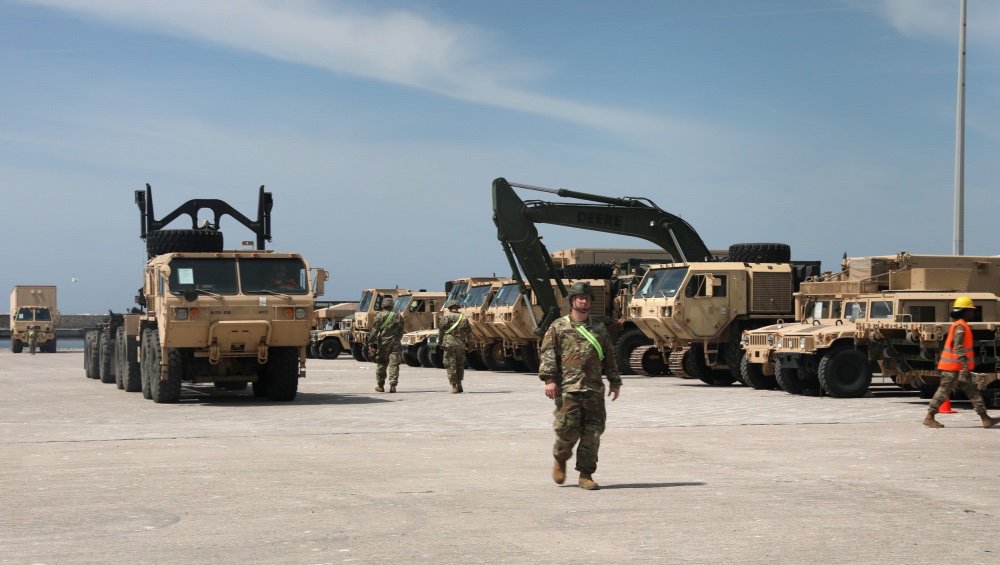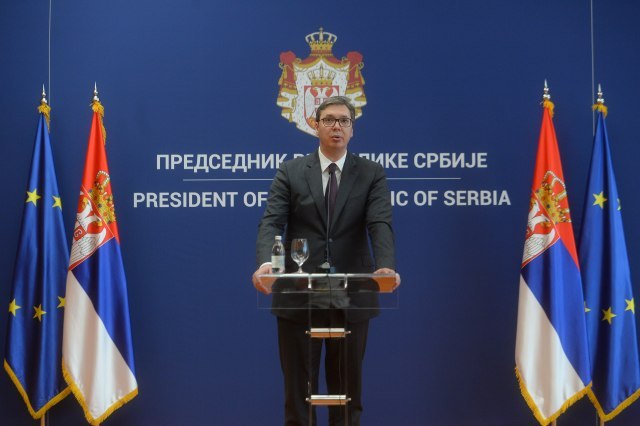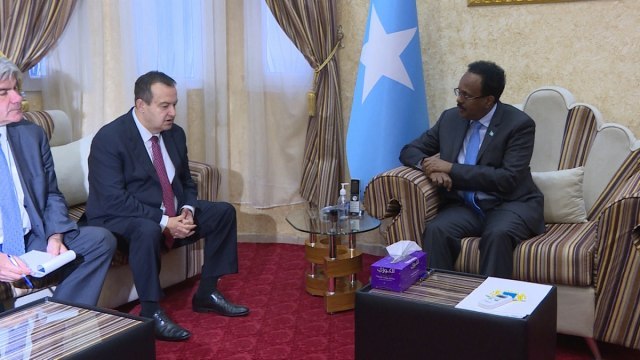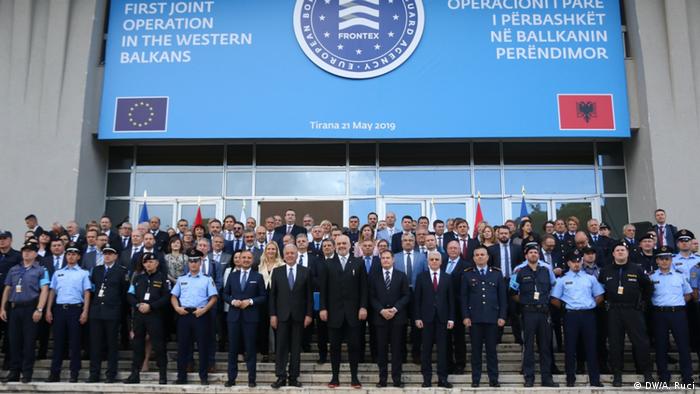SManalysis
24 Μαΐου 2019,
Tribune
Διαβάστε σχετικά για Αλβανία, Βαγγέλης Ντούλες, Βαλκάνια, Έντι Ράμα, Λουλζίμ Μπασά,
Στην Αλβανία κλιμακώνεται η πολιτική κρίση. Η αντιπολίτευση ισχυρίζεται ότι η Βουλή δεν έχει απαρτία και ήρθε η ώρα του Έντι Ράμα να αποχωρήσει.
Ο Έντι Ράμα κάλεσε τον ηγέτη της αντιπολίτευσης, Λουλζίμ Μπάσα, σε διάλογο άνευ όρων, εκείνος όμως αρνήθηκε και κάλεσε τον λαό σε ανένδοτο αγώνα.
Η θέση του Βαγγέλη Ντούλε
Η ιστοσελίδα Balkan.web έγραψε ότι, με ανάρτησή του στο twitter ο πρόεδρος του ελληνικού μειονοτικού κόμματος ΚΕΑΔ, Βαγγέλης Ντούλες, υποστήριξε ότι, η αδυναμία συμπλήρωσης της Βουλής με 140 βουλευτές τη θέτει εκτός λειτουργίας.
Πάει μάλιστα και πιο πέρα. Δηλώνει ότι σε συνθήκες που δεν λειτουργεί το Συνταγματικό Δικαστήριο η ευθύνη διάλυσης της Βουλής είναι στον Πρόεδρο της Δημοκρατίας.
Παρότι συμπληρώθηκαν έδρες στην αλβανική Βουλή, από εκείνες που παρέδωσε η Αντιπολίτευση, σήμερα έχει 122 βουλευτές, δηλαδή μικρότερος αριθμός από τους 140 που απαιτούνται για να λειτουργεί το κοινοβούλιο.
Η ανάρτηση του Βαγγέλη Ντούλε έχει ως εξής:
«Ανεξάρτητα από τη φάρσα αντικατάστασης της Αντιπολίτευσης, τώρα και με μαθηματική ακρίβεια μπορούμε να πούμε ότι, δεν μπορεί πλέον να γίνει σεβαστό το άρθρο 64 του Συντάγματος που κάνει λόγο για 140 βουλευτές.
»Η Βουλή δεν μπορεί να λειτουργήσει.
»Σε συνθήκες που το Συνταγματικό Δικαστήριο δεν λειτουργεί, νομικοί λόγοι απαιτούν από τον ΠτΔ να αναλάβει τη πρωτοβουλία διάλυσης της Βουλής».
«Δεν μπορούν να γίνουν αυτοδιοικητικές εκλογές στην Αλβανία»
Η εφημερίδα «Γκαζέττα Σκιπτάρε» έγραψε ότι οι σύμμαχοι του ηγέτη της αντιπολίτευσης, Λουλζίμ Μπάσα, σε συνάντηση που πραγματοποίησαν με πολίτες της πόλης Λέζα, δήλωσαν για ακόμη μια φορά πως ο πρωθυπουργός Ράμα καταστρέφει τον πολιτικό πλουραλισμό της χώρας.
Επεσήμαναν ότι δεν μπορούν να διεξαχθούν αυτοδιοικητικές εκλογές στις 30 Ιουνίου στην Αλβανία με τον Έντι Ράμα πρωθυπουργό.
Στις 25 Μαΐου μεγάλη διαδήλωση στα Τίρανα
Σύμφωνα με τους ίδιους, η μόνη οδός για την επίλυση της κρίσης το συντομότερο είναι μια μεταβατική κυβέρνηση στην Αλβανία.
Τόνισαν πως η διαμαρτυρία της 25ης Μαΐου θα είναι καθοριστική για το μέλλον της χώρας.
Ο Βαγγέλης Ντούλες είπε ότι οι διαμαρτυρίες είναι μια πραγματική αναγκαιότητα για τους Αλβανούς.
Απηύθυνε έκκληση στους πολίτες να συμμετάσχουν στη νέα διαμαρτυρία της Αντιπολίτευσης το Σάββατο 25 Μαΐου.
Ο Ράμα ζήτησε διάλογο
Ο Έντι Ράμα απέστειλε ανοικτή επιστολή προς τον Λουλζίμ Μπάσα για διάλογο άνευ όρων.
Όπως έγραψαν οι αλβανικές εφημερίδες, ο Έντι Ράμα ζητά διάλογο άνευ όρων με στόχο την εξεύρεση διεξόδου από τη σημερινή κατάσταση.
Ο Ράμα στην επιστολή του επισημαίνει ότι δεν υπάρχει περίπτωση η Αντιπολίτευση να εμποδίσει τη διενέργεια των δημοτικών εκλογών στις 30 Ιουνίου.
Προσθέτει ότι ο ίδιος δεν έχει καμία νομική ισχύ να αναβάλει για αργότερα από τις 30 Ιουνίου, τη διενέργεια των εκλογών.
Ο Μπάσα ζήτησε να παραιτηθεί ο Ράμα
Από το Δυρράχιο όπου ήταν σε συνάντηση με οπαδούς του, ο Μπάσα επανέλαβε ότι η απομάκρυνση Ράμα είναι αδιαπραγμάτευτος όρος.
Η αποδοχή της πρόσκλησής του θα ήταν συνθηκολόγηση του λαού μπροστά σε έναν πρωθυπουργό που στέκει στην εξουσία με τη βοήθεια του εγκλήματος και μπροστά στις συμμορίες του εγκλήματος.
Η άλλη εκδοχή, δήλωσε ο Μπάσα, είναι η αποφασιστική αντιμετώπιση μέχρι τη νίκη επί της συμμορίας στην εξουσία.
Σε περίπτωση που ο Ράμα επιχειρήσει να κάνει εκλογές–φάρσα με τους λωποδύτες στις 30 Ιουνίου, τότε θα υπάρξει αντιπαράθεση σε κάθε εκλογικό τμήμα στην Αλβανία.
Δεύτερη επιστολή Ράμα
Ο Ράμα έστειλε και δεύτερη ανοιχτή επιστολή – πρόσκληση προς τον Μπάσα.
Ζητώντας για δεύτερη φορά διάλογο άνευ όρων.
Ο Ράμα χαρακτήρισε «βάναυση» την άρνηση Μπάσα για διάλογο.
Πρόσθεσε όμως ότι είναι πρόθυμος να ανοίξουν τον δρόμο του διαλόγου.
Στην επιστολή ο Ράμα γράφει στον Μπάσα ότι οδηγεί το Δημοκρατικό Κόμμα στον γκρεμό.
Ότι επιδιώκει μια κοινωνία χωρίς νόμους και κανόνες.
Ότι έχει εναντίον του την πλειοψηφία των Αλβανών πολιτών και όλους τους διεθνείς εταίρους.
Επαναλαμβάνει για μία ακόμα φορά ότι για εκείνους που θα διαπράξουν εκλογικά ποινικά αδικήματα, θα κλείσει ο δρόμος για ταξίδια σε ΗΠΑ και χώρες της Ε.Ε.
Έχουν μείνει λίγες ημέρες ακόμα, γράφει ο Ράμα και καλεί τον Μπάσα για διάλογο άνευ όρων και χωρίς να χάνουμε χρόνο!
Του συνιστά να αφήσει τις απειλές και να αλλάξει δρόμο προσερχόμενος σε διάλογο.
Διαφορετικά η πολιτική παράταξη της οποίας ο Μπάσα ηγείται, θα διαλυθεί.
Καταλήγοντας γράφει ότι κανείς δεν μπορεί να εμποδίσει, ούτε την εφαρμογή της μεταρρύθμισης στη Δικαιοσύνη, ούτε και την πραγματοποίηση των εκλογών στις 30 Ιουνίου.
Δεύτερη απάντηση Μπάσα
Ο Λουλζίμ Μπάσα απάντησε από το Facebook και απευθυνόμενος, όχι στον Ράμα, αλλά στους Αλβανούς πολίτες.
«Αγαπητοί συμπολίτες,
»χθες το Ανώτατο Δικαστήριο έμεινε με δύο μόνο μέλη και δεν μπορεί να λειτουργήσει, το Συνταγματικό Δικαστήριο έχει δύο χρόνια που δεν λειτουργεί, έχει μείνει χωρίς μέλη, με αποτέλεσμα ο πρωθυπουργός να ασκεί απεριόριστη εξουσία και να κυβερνά με προσωπικά φιρμάνια.
»Χθες, αφού δήλωσε ότι είναι καλύτερα, οι Αλβανοί να μην έχουν δικαστήρια, ο Ράμα με κάλεσε σε “διάλογο” με επιστολή που μου απηύθυνε, ισχυριζόμενος ότι “αυτό απαιτεί η Δημοκρατία”.
»Η Δημοκρατία στην πραγματικότητα, απαιτεί, τις διαφωνίες που δεν μπορεί να τις λύσουν οι πολιτικοί, τις λύνει ο λαός με την ψήφο του.
»Για τον Ράμα όμως, η τέχνη της δημοκρατικής διακυβέρνησης είναι κάτι το ξένο που δεν γνωρίζει, αυτός είναι δεξιοτέχνης στην τέχνη της απάτης, η διακυβέρνησή του ήταν καταλήστευση και εξαπάτηση του λαού, της περιουσίας του Δημοσίου.
»Εάν ο Ράμα σέβονταν έστω και ελάχιστα το λαό, θα είχε υποβάλει παραίτηση τουλάχιστον 20 φορές μέχρι τώρα.
»Θα έπρεπε να είχε παραιτηθεί όταν έκανε τους εγκληματίες βουλευτές και Δημάρχους, όταν μετέτρεψε την Αλβανία σε χασισο-βολώνα της Ευρώπης, όταν ο ΥΠΕΣ Ταχίρι μας προέκυψε έμπορας ναρκωτικών, όταν ο άλλος ΥΠΕΣ Φατμίρ Τζάφα υπερασπίζονταν τον αδελφό – διακινητή ναρκωτικών, όταν η εταιρεία του Δημάρχου Ελμπασάν διαπιστώθηκε ότι διακινούσε ναρκωτικά, όταν ανακαλύφθηκε ότι ο αδελφός του πρωθυπουργού, ο Όλσι Ράμα, είχε διασυνδέσεις με το κύκλωμα κοκαΐνης της Τζιμπράκα Ελμπασάν, όταν αποκαλύφθηκαν τα σκάνδαλα με την εκχώρηση των περιουσιών του Δημοσίου, όταν ανακαλύφθηκε το σκάνδαλο με τα 30 εκατ. ευρώ του Περιφερειακού Τιράνων.
»Όφειλε να παραιτηθεί όταν ανακαλύφθηκε ότι έκλεψε τις ψήφους στις εκλογές του 2017 μαζί με τον πρώην Υπουργό Νταμιάν Γκικνούρι και το Δήμαρχο Δυρραχίου Βαγγιούς Ντάκο και άλλους κακόφημους εγκληματίες.
»Έπρεπε να είχε παραιτηθεί όταν φτωχοί άνθρωποι, κακοποιήθηκαν και πέθαναν στη φυλακή όπου κρατούνταν για απλήρωτο λογαριασμό ρεύματος ή για κάποιο μικρό αυθαίρετο, όταν κατεδάφισε τα σπίτια, χωρίς αποζημίωση και χωρίς δικαστική απόφαση, πολιτών στη Χεμάρρα, στον Περιφερειακό Τιράνων, στη Σκόζα Τιράνων και παντού στην Αλβανία.
»Έπρεπε να παραιτηθεί όσες φορές η Ε.Ε δεν ξεκίνησε διαπραγματεύσεις με την Αλβανία, να παραιτηθεί όταν οι Αλβανοί άρχισαν να φεύγουν μαζικά από τη χώρα, όταν άρχισαν να απομακρύνονται οι ξένοι επενδυτές, για να τους αντικαταστήσουν τα μέλη της ντόπιας ολιγαρχίας ή Ρώσοι και Ανατολικοί εγκληματίες, όταν η Ευρώπη άρχισε να ανησυχεί για το γεγονός ότι η Αλβανία μετατράπηκε σε σίγουρη βάση του οργανωμένου εγκλήματος.
»Ο Ράμα δεν υπέβαλε ποτέ την παραίτηση, κράτησε όλη την εξουσία με κάθε μέσο, με εγκληματίες, με χρήματα, με την ολιγαρχία, με ΜΜΕ και ρημάζει τη χώρα καθημερινά.
»Η Αλβανία έχει ανάγκη σήμερα για μια πραγματική πολιτική, οικονομική και κοινωνική αλλαγή, οφείλουμε να απαλλάξουμε την πολιτική από το βρώμικο χρήμα και τον αυταρχισμό, να απαλλάξουμε την οικονομία από την ολιγαρχία, από τα μονοπώλια και την κρατική βία.
»Αυτή είναι μια μεγάλη πρόκληση που ανήκει σε όλους μας, γι΄ αυτή την πρόκληση ξεκινήσαμε εθνικό διάλογο με όλους.
»Αυτός είναι ο μοναδικός διάλογος που αλλάζει την Αλβανία, και ο μοναδικός διάλογος όπου εγώ θα μετάσχω.
»Ασάλευτη και ρητή θέση μου είναι ο Ράμα πρέπει να φύγει αμέσως από πρωθυπουργός, διότι κατέστρεψε τις ελεύθερες εκλογές και στρέβλωσε τη βούληση του λαού.
»Για τη μεγάλη αλλαγή που θέλουμε να κάνουμε, σας καλώ όλους να ενωθούμε στις διαμαρτυρίες μας για την απομάκρυνση του Ράμα, να ενωθούμε στον εθνικό διάλογο για την πραγματική αλλαγή που θέλουμε για να διασφαλίσουμε το ευρωπαϊκό μέλλον της Αλβανίας».











